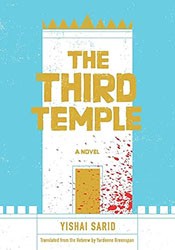In his debut novella, Yishay Ishi Ron draws on his own experiences to craft an intimate, raw, yet tender portrait of his protagonist’s psyche and that of Israel’s wounded society. Read today against the headlines out of Gaza, Dog wields perhaps even greater force and urgency than when it was first published, in Hebrew, in June 2023. Yardenne Greenspan’s nimble translation captures the original’s gritty, propulsive lyricism, and tragic, humane depths.
Dog’s narrator is Geller, a decorated officer from an elite combat unit, who now stalks the underbelly of Tel Aviv to feed his heroin addiction and lives with two other junkies. Wounded in combat during a Gaza campaign, he is haunted by visceral memories of his comrades burning alive in an armored personnel carrier. He also fixates on the memory of a dog, cruelly killed during combat operations. When a stray mutt crosses his path, he desperately attempts to care for it despite his struggles to even feed himself. Estranged from his old army comrades and his family, too, he faults his father, who lies comatose in a hospital, “connected to his drip irrigation system like a hydroponic plant.” Geller muses bitterly, “I know that if he were conscious he’d show me the way out of drugs. Sometimes I hate him for all the poison he’d fed me over the years about the commandos, his stories about the First Lebanon War, the conquering of the Beaufort. He bottle-fed me Golani lore.” He thinks, “I had no choice but to grow up to fill his shoes.” In this sense, Geller is a surrogate for generations of Israeli youth, raised on an idealization of militarism and self-sacrifice in pursuit of nationalist goals.
Dog’s themes are dark, and the violence in Geller’s past and present is pervasive, yet an emphasis on nurturing relationships emerges. Doris, a woman with her own sad history, sees something in Geller, and becomes intent on improving his circumstances. For his part, Geller does his best to protect the unnamed, abused dog he’s taken under his care. Only much later does the basis for Geller’s devotion to the stray become clear.
Geller’s heartrending journey is relayed in short, suspenseful chapters, some of which are told, effectively, from the beleaguered dog’s perspective. Nothing is quite linear in Geller’s story, and its portrayal of trauma and addiction, recovery and relapse, is unsparing. Crucial events fade in and out. But after Geller is accused of murdering one of his fellow squatters and faces the prospect of an even more tormented future, the final third of Dog races ahead toward its emotional conclusion.
In a stirring author’s note, Ishi Ron describes his own experience with the horrors of wartime trauma and addiction, and overcoming his prolonged disbelief that his severe PTSD was a medical condition that could be treated. Ron dedicates the book to the unspecified “combatants whose eyes have seen things that their minds refuse to forget.” For that grim reason alone, Dog deserves to find a wide, global audience.
Ranen Omer-Sherman is the JHFE Endowed Chair in Judaic Studies at the University of Louisville, author of several books and editor of Amos Oz: The Legacy of a Writer in Israel and Beyond.





